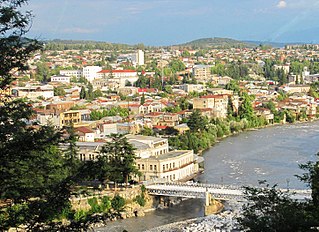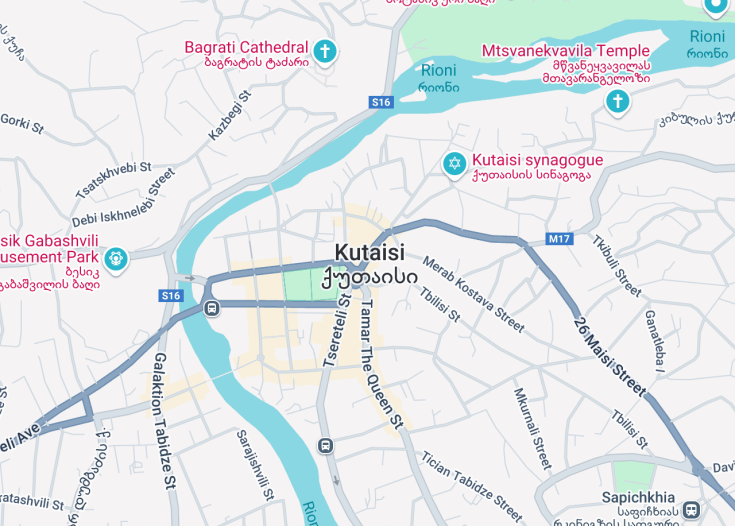Kutaisi, Georgia’s legislative capital and its third-largest city, presents a mesmerizing blend of ancient and modern. This city, nestled on the banks of the Rioni River, boasts a history that stretches back more than 3,000 years, making it one of the oldest continuously inhabited cities in the world.
Visitors can explore medieval monasteries, vibrant markets, and verdant parks. The city is renowned for its splendid architectural landmarks such as the Bagrati Cathedral and Gelati Monastery, both UNESCO World Heritage Sites, which exemplify the fusion of Eastern and Western architectural styles.
When visiting Kutaisi, ensure you explore its historical sites early in the morning to avoid the crowds and fully absorb the serene atmosphere of the ancient landmarks.
Include a visit to the bustling local markets to experience the daily life of Kutaisi’s residents and try some regional delicacies such as Imeretian cheese and khachapuri.
Top things to do & see in Kutaisi
Select the following sights and activities to discover best tickets and tours available in Kutaisi.
Kutaisi: The Heart of Georgian History and Culture
| Country | Georgia |
| Time in Kutaisi | GMT+4 |
| Language spoken | Georgian |
| Population | 147,635 (Source: National Statistics Office of Georgia, 2020) |
| Currency | Georgian Lari (₾, GEL) |
| Airports |
|
Kutaisi, the legislative capital and the third largest city in Georgia, stands as a testimony to the region’s rich history which dates back over 3,000 years. It is a city where past and present seamlessly merge, offering visitors a unique glimpse into the soul of Georgian culture and heritage. The city’s historical significance is highlighted by its status as the former capital of various Georgian kingdoms, and its numerous well-preserved architectural sites such as the Bagrati Cathedral and Gelati Monastery, both of which are UNESCO World Heritage Sites.
Beyond its historical allure, Kutaisi is known for its vibrant contemporary culture, which is evident in its lively festivals, theaters, and museums. The city also serves as a central transit hub in western Georgia, making it an accessible point for exploring the lesser-known landscapes of the region, such as the Prometheus Cave and the Sataplia Nature Reserve. Kutaisi serves not just as a historical gem but as a beacon for eco-tourism and adventure in Georgia.
Where is Kutaisi?
Kutaisi is situated in the Imereti region of western Georgia, lying along the banks of the Rioni River.
Distances:
| Route | Distance by car | Time by car |
|---|---|---|
| Tbilisi to Kutaisi | 142 miles (229 km) | approx. 3 hours |
| Batumi to Kutaisi | 93 miles (150 km) | approx. 2.5 hours |
What is Kutaisi famous for?
Kutaisi is renowned for its splendid historical architecture, particularly the Bagrati Cathedral and Gelati Monastery, both acclaimed as UNESCO World Heritage Sites. The city’s rich history, coupled with its tradition of education and culture, makes it a fascinating destination in Georgia.
History
Prehistoric to Early Medieval Period (Before 6th Century AD)
Kutaisi, one of the oldest continuously inhabited cities in the world, traces its history back to ancient times. Archaeological evidence suggests that the area around Kutaisi was settled as early as the sixth to fifth millennia BC. By the 6th century BC, it evolved into a significant urban center under the kingdom of Colchis, known in Greek mythology as the destination of Jason and the Argonauts in their quest for the Golden Fleece. The city served as a pivotal crossroad between the east and west due to its strategic location.
Byzantine and Golden Age (6th Century – 12th Century)
In the early medieval period, Kutaisi became a prominent city under the Kingdom of Georgia. It reached its zenith during the reigns of King David IV and Queen Tamar in the 11th and 12th centuries, known as the Georgian Golden Age. During this era, Kutaisi was a vital cultural, religious, and political center, immensely contributing to the Georgian renaissance in arts and literature.
Ottoman Rule to Modern Era (15th Century – Present)
After a period of decline due to the Mongol invasions, Kutaisi fell under the rule of various powers, including the Ottoman Empire in the 15th century, which significantly influenced the city’s development and cultural landscape. The city regained importance in the 19th century when it became part of the Russian Empire, leading to an economic and cultural revival. Today, Kutaisi is Georgia’s legislative capital and a primary educational and tourism center, preserving its historical charm while integrating modernity.
Visit Kutaisi
Must-See Attractions in Kutaisi
In Kutaisi, immerse yourself in a rich tapestry of history and culture. Noteworthy sites include:
- The Gelati Monastery, a UNESCO World Heritage site, renowned for its frescoes and mosaics.
- Bagrati Cathedral, an 11th-century architectural marvel offering panoramic views of the city.
- The Prometheus Cave, a natural wonder filled with stunning stalactites and stalagmites.
- Historic Satsnakheli Wine Cellar, where visitors can taste traditional Georgian wines.
These landmarks provide insight into the ancient and medieval heritage that shapes modern Kutaisi.
Cultural Festivals and Events
Kutaisi hosts several cultural festivals and events throughout the year that showcase its rich history and vibrant contemporary culture. The Kutaisi International Theater Festival, held in September, attracts performers and audiences worldwide, emphasizing the city’s longstanding theatrical tradition.
Another significant event is the Gelati Festival in August, celebrating Georgian music, dance, and crafts at the historic Gelati Monastery.
Best Time to Visit Kutaisi
The best time to visit Kutaisi is in the late spring (May and June) and early autumn (September and October). During these periods, the weather is pleasantly warm, and the natural scenery is at its most vibrant, ideal for exploring the city’s outdoor attractions and participating in cultural events.
Is Kutaisi Worth Visiting?
Kutaisi is unquestionably worth visiting for anyone interested in history, architecture, and natural wonders. Its blend of ancient heritage sites with vibrant cultural festivals makes it a unique destination that offers something for every traveler.
Whether exploring its historic monasteries, wandering through lush landscapes, or enjoying the local cuisine, Kutaisi provides a deeply enriching travel experience that connects visitors with the heart of Georgian culture.










